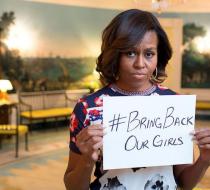#BringBackOurGirls--Another Clicktivism or Activism? 3 Favorite
Michelle Obama tweeted her own portrait holding a sign reading #BringBackOurGirls and soon countless celebrities echoed this meme online. Throughout a week, this trending hashtag had been turned into a social-media supernova. The #BringBackOurGirls campaign spurred by online sharing brought the outrage against Chibok schoolgirls kidnapping to the global stage.
On April 14, 2014, 276 schoolgirls in Chibok were kidnapped from Government Secondary School by Boko Haram terrorists in Nigeria.
This movement demanded the return of those kidnapped girls, tugging at world’s heart strings. In less than three weeks, the hashtag had been used over 1 million times. No matter it was the famous actress Emma Watson or supermodel Cara Delevingne, everyone was acting out a call to #BringBackOurGirls. With this clicking and sharing, millions of selfies were disseminated across the countries, mounting the social media noise. It shed light on how to voice injustice, inhumanity, and invisibility of the voiceless. With the missing girls named, the terrorists and government were ashamed. But how about the girls? Have they returned?
Unfortunately, this year since this hashtag trended globally did not witnessed what was written on those millions of pieces of paper became the truth. One year after the girls disappeared, 57 of them escaped while 219 remained missing. Families are still grieving for their loss. Meanwhile, the hashtag campaign was accused of protesting too much but accomplishing too little. Instead of being activism, it was rather regarded as clicktivism which indicated this acting out was powerless that no changes could be expected. Some people claimed they felt guilty and vain for engaging in this sharing because of their own powerlessness. However, others refuted by saying that we had been successful in bringing people outside of Nigeria to connect with, and support, people in Nigeria in a special way. This, we are experiencing, is the change.








